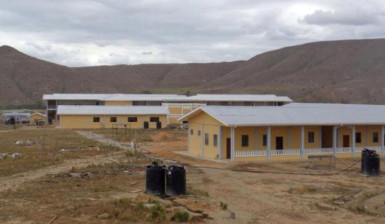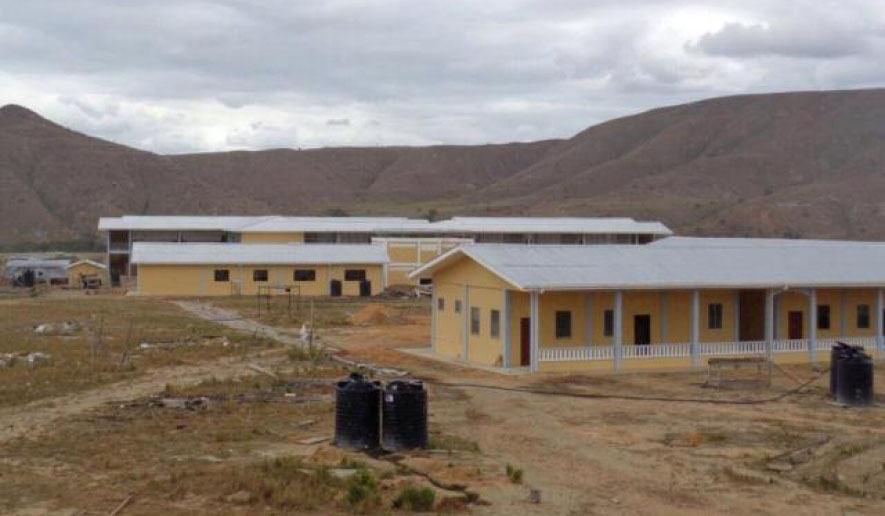While the defects at the $728 million Kato Secondary School in Region Eight have been fixed in a record two months by contractor Kares Engineering, the school will not be opened when the new term begins tomorrow because there has been a delay in getting it furnished.
“The school has been fixed by the contractor Kares Engineering but it won’t be opened in time for Monday because we can’t get the furniture into the area as yet,” Permanent Secretary of the Ministry of Education Vibert Welch told Stabroek News last Tuesday.
“We have found that it is not financially feasible to send the furniture by air, and because of the rainy weather, the trucks cannot take them in as yet. The furniture is there, it is ready but we have to wait. So we have to wait for some dry weather …and start that process,” he added.

Welch also said that the school will be solar powered and that the panels for that project are also awaiting transport to the location.
Under the former People’s Progressive Party/Civic government, almost €1.8 million in European Union (EU) funding for the proposed Kato Hydropower Project expired in February, 2015. The school complex was built as a pre-condition for the EU’s investment and it was expected to be the main consumer of power supplied by the plant.
The current government pleaded with the EU for an extension but it was too late and as a result a decision was taken to install a hybrid solar-diesel system, for which it secured funding from IDB. The funding also covered the acquisition of the panels for the school.
Asked for a projected timeframe for when the furniture and panels would be transported to the area, Welch said he did not want to give a definitive one. He adopted the same position when asked what date the school will be opened.
“I am not going there before I say ‘next week or the week after’ and then something comes up and it is not so and you write a story and say, ‘Oh Mr Welch de say so, so, so….’ We will begin when the roads have dried,” the Permanent Secretary noted.
Though reported to have been completed in 2015, the Kato Secondary School was never occupied as it was found to have major defects.
Rodrigues Architects Ltd was subsequently contracted to undertake a technical audit of the building and it found, among other things, that the standard of construction and the quality of materials and workmanship were below average. It also said the foundations and frames were 20 to 25 percent below the specified strength; corridors, floors, ceilings, stairs and walkways had major defects; and there was deviation from the specifications and design/construction drawings.
Deeming the building unsafe for occupation, the firm estimated that at least $144 million would be required to fix the defects.
Stabroek News tried getting the costs from the contractor but Kares’ Managing Director Rajesh Rameshwar would not comment.
In early May of this year, the Ministry of Education said that the contractor was obligated, under the contract, to provide corrective works as there was a one-year guarantee against defects at the school. “He knows that he is obligated by the contract.
He even wrote a letter saying that he would stand the costs,” Victor Graham, the Education Ministry’s Chief of Works had explained to Stabroek News.
Graham pointed out that while he was unsure at the time of the direct amount to be spent on the corrective works, he knew that Kares would have to stand the amount and the works would have commenced later in the month. “The only cost the ministry will be bearing would be the independent consultant who will supervise the work, that is the only thing,” he said.
In July, Junior Minister of Public Infrastructure Annette Ferguson announced that by July 26 Kares would be issued with the certificate of practical completion as the school repairs were completed and all was well.
According to a report from the Department of Public Information (DPI), Ferguson’s announcement followed a tour of the facility by a ministerial task force comprising officials from the Public Infrastructure, Education and Indigenous Affairs ministries. The task force was charged with looking at the remedial works to be completed.
The Ministry of Education’s representative, Phillip Smith, a consultant for the buildings unit, reportedly praised the contractor for the speedy corrective works. DPI quoted him as saying that it “was fantastic to have the remedial works completed in such record time based on the damning reports originally received.”
Rameshwar had also expressed gratitude to the government for the opportunity to remedy the defects identified. “We are grateful that we were given the process and a chance to correct what were perceived as major faults.
“Those are corrected and in record time. We were given the defects list by the consultant and we worked to correct those identified as well as other eventualities we found. We had a large work force that worked for 18hrs daily to complete,” he was also quoted as saying.






